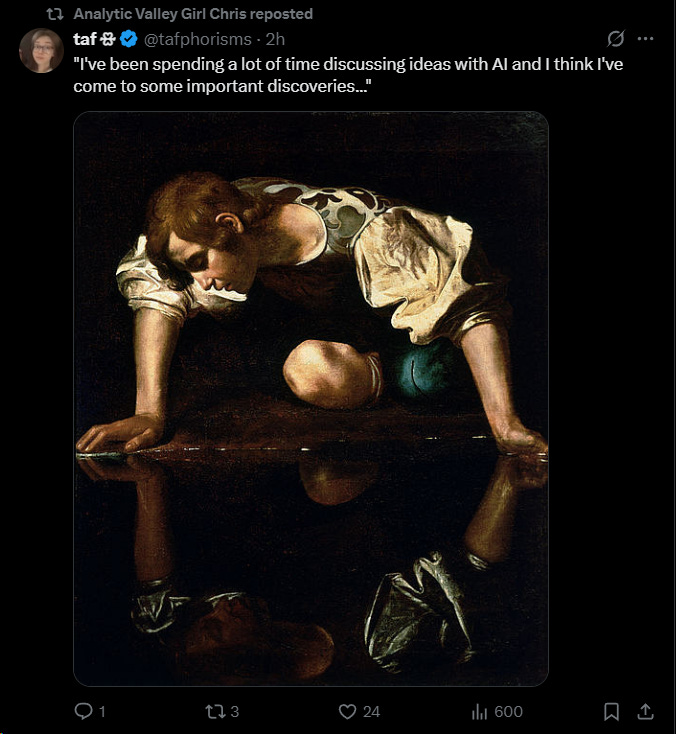Escaping the Echo Chamber
How to Avoid AI-Mediated Narcissism
It's easy—and seductive—to mistake conversations with sophisticated AI for genuine discovery. Caravaggio's Narcissus offers a powerful metaphor here, cautioning against confusing the reflection of one's own beliefs and desires with objective insights. To maintain intellectual honesty and originality in an age of AI-assisted thought, it's essential to actively resist falling into echo chambers.
Here’s how to do it:
1. Distinguish Reflection from Insight
Explicitly challenge yourself by asking regularly:
Am I discovering something genuinely novel, or merely reinforcing what I already believe?
Insight must add to your mental model, not just restate it.
2. Adopt Dialectical Thinking
Actively seek critique and counterarguments. AI can help by:
Steel-manning opposing views
Identifying hidden assumptions
Generating alternative perspectives
Force yourself into positions of productive intellectual discomfort to ensure growth.
3. Ground Ideas in External Validation
Regularly test and validate theories against:
Empirical evidence
Peer-reviewed research
Practical experiments
External reality provides essential checks against self-delusion.
4. Define Clear Criteria for "Discovery"
Establish explicit criteria that distinguish genuine discoveries from mere confirmations, such as:
Predictive accuracy
Novel explanatory power
Resistance to falsification through rigorous critique
Discovery should be measurable and demonstrably useful, not merely rhetorically satisfying.
5. Cross-Check with External Experts
Exposing your ideas to public or expert scrutiny is crucial. Consider:
Collaborating with domain experts
Publishing openly for critique
Participating in professional forums
Diverse, external perspectives break the illusion of consensus.
6. Be Explicit About Uncertainty and Bias
Acknowledge and articulate your assumptions explicitly:
Regularly ask AI: What biases or assumptions of mine might you be unintentionally reinforcing?
Consciously identify and challenge your cognitive biases.
Transparency about uncertainty guards against complacency.
7. Pursue Novelty and Surprise
Encourage and explore unexpected directions:
Ask explicitly for surprising insights or alternatives
Investigate responses that initially feel counterintuitive
Genuine discoveries often lie precisely where they are least expected.
8. Seek Practical Tests and Applications
Ground conversations in specific, testable scenarios:
Shift regularly from abstract theorizing to concrete experiments or predictions
Apply theoretical insights practically to validate their real-world utility
Practicality forces rigor and guards against overly abstract self-referential thinking.
By systematically practicing these approaches, we avoid becoming AI-mediated Narcissus, trapped in the mesmerizing reflection of our own ideas. Genuine intellectual growth demands vigilance against the seduction of mere confirmation and the courage to pursue truth even when it disrupts our comfortable illusions.



